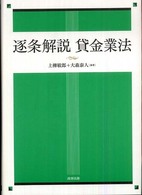- ホーム
- > 洋書
- > 英文書
- > History / World
Full Description
The academic debate in Western social science about the growing "convergence" or similarities between American and Soviet society acquired political significance in the diverse relationships that made up the global Cold War. Convergence and Cold War, 1953-1964 explores the consequences and challenges of convergence through a discussion of U.S.-Soviet relations, Sino-Soviet relations, and East-South relations.
The book argues that the debate about convergence was a debate about the character of the broader Cold War itself, and the background to the more recent experience of contemporary globalization and its shared practices and norms. The volume begins by addressing how Americans debated the prospect of a less threatening socialist world shaped by the challenges of industrial modernity, while the Soviets hoped to imitate Western standards of living alongside developing supposedly more elevated forms of consumption, leisure, culture, trade, and economic exchange. The second section analyzes the way supporters of Chairman Mao in China associated the socialist bloc's engagement with the West as an example of its deterioration and dangerous abandonment of socialist values and practices. The closing chapters examine how the Chinese communicated their frustration with the Soviets and East Europeans to postcolonial states in the Global South. Jersild unpacks this through a case study of Guinea-Conakry, which posed questions about the common practices and policies of the superpowers.
This volume is a valuable resource to students and scholars of the Cold War and International Relations, as well as all those interested in postcolonial studies and the history of globalization.
Contents
Acknowledgements
Introduction:1953-1964 as International History
Part One: Convergence and Consumerism: U.S.—Soviet Relations
1. Telling the Story of "Socialist Consumerism"
2. The USIA National Exhibit, Moscow: Strategic Consumerism and U.S. Foreign Policy
Part Two: Convergence and Collusion: Sino—Soviet Relations
3. Mao's Version of the Socialist World
4. Khrushchev's Version of the Socialist World
Part Three: Convergence and Colonialism: East—South Relations
5. Advising, Aid, and Trade in Guinea-Conakry: Hopes, Frustrations, Outcomes
6. Two Imperialisms: Chinese Lessons for the Guineans
Conclusion: Convergence and Cold War
Bibliography








